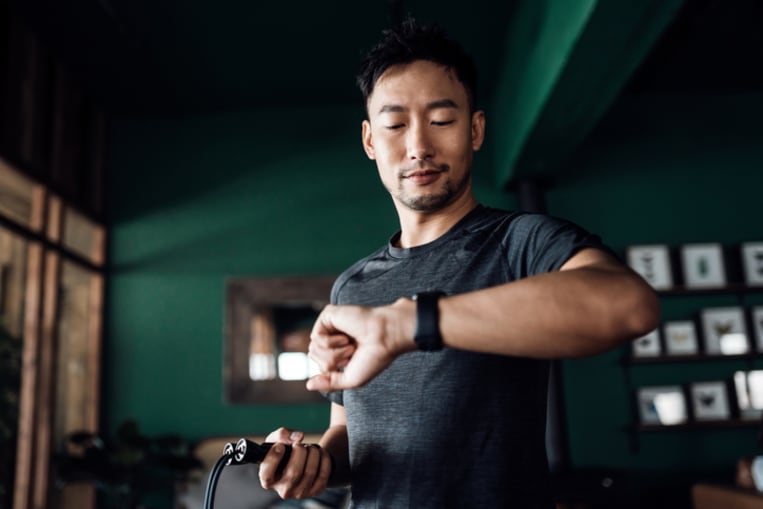
BBB Tip: How to choose a fitness tracker

(Getty Images)
Wearing a fitness tracker is a great way to develop healthy habits and reach your fitness goals. With a plethora of brands and models to choose from, you can find trackers with only basic functions to ones loaded with all the bells and whistles you need to track specific sports activities, body functions, and more. Sorting through all the tech can seem overwhelming, but it doesn’t need to be. Choosing the perfect fitness tracker really boils down to just a few basic considerations about your lifestyle and health goals. The following tips will help you make a solid purchasing decision.
Tips for choosing the best fitness tracker
- Understand your health goals. The first step to choosing a fitness tracker that will work for you is understanding your needs and priorities. Think about your lifestyle, your goals for exercise, rest, and nutrition, and the specific data that would be useful to you in reaching those goals.
- Assess fitness trackers’ functionality. Fitness trackers have many different features, so consider what functions you need. Trackers can monitor your heart rate, pulse oxygen levels (SpO2), the steps you take, and the stairs you climb. Some have ECG sensors that measure your heart’s electrical activity. Some are only sweat resistant, while others are water-resistant or fully waterproof. Increasingly, trackers offer sleep insights by tracking your sleep habits and letting you know how much time you spend in the different sleep stages. Others pair with your smartphone to give you alerts about messages or calls. Some even help you track your meals and reach your nutrition goals.
- Evaluate specific activities you participate in. For example, if you are an avid hiker, GPS functions and navigation might be important. It could be worth paying more for a tracker that gives you the most precise location tracking, logs your mileage and elevation, and allows you to mark your trail. The same goes for other sports too. If you love cycling, skiing, swimming, or something else, look for a fitness tracker with an activity-specific mode for your sport activity-specific mode for your sport of choice to get tailor-made functions and more accurate data.
- Don’t be afraid to go basic. If your biggest goal is to track your steps and walk more during the week, you may not need the fanciest fitness tracker on the market. There are plenty of reliable trackers out there with basic functions that won’t break the bank. You could even consider using your smartphone to monitor your fitness if you don’t need anything more than a basic step counter.
- Look at the display. Look for a display that is easy to read and navigate. Some fitness trackers have a watch-face display, while others display your current step count. Some even send you motivational fitness messages throughout the day. Think about what you want from a display when choosing a fitness tracker.
- Consider the companion app. Most fitness trackers use a companion app to sync data to your smartphone or computer. Consumer Reports encourages consumers to preview the tracker’s app on Google Play or the Apple App Store before buying a fitness tracker to see how it analyzes, interprets, and archives data. Pay close attention to consumer reviews on the app store to see if it lives up to most people’s expectations.
- Think about charging options. Battery life on fitness trackers varies widely. Some fitness trackers need to be charged each day, while others have a battery life of several days. Charging methods can vary too. Some trackers have built-in solar panels, some have wireless chargers, and others must be plugged into the wall. Make sure the charging method fits your lifestyle. Think too about when it will be most convenient to charge the device. For example, night charging won’t be a good option if you want to track your sleep habits.
- Check out accuracy ratings. Most fitness trackers aren’t always 100 percent accurate and will have a small degree of error. Choose a tracker designed with your preferred activities in mind for better accuracy, and check third-party review sites for more information on the accuracy of specific fitness trackers.
- Keep your style in mind. Fitness trackers come in all kinds of shapes, colors, and materials. Owning a fitness tracker that looks as good as it works means you might be more inclined to keep it on for a dinner date and continue tracking your steps all evening. If a style is important to you, factor it into your decision.
- Try it on. Make sure the fitness tracker is comfortable before you buy it. If it isn’t comfortable, you probably won’t feel inclined to use it – especially if you want to wear it at night for sleep tracking.
- Make sure the device is secure. Fitness trackers store a lot of personal information, so choose a tracker from a reputable brand. You’ll want to be sure the tracker’s software is regularly updated to fix bugs, improve functionality, and keep your data secure. Find out what you need to do, if anything, to install any software updates that come out after buying your tracker.
For more information
Learn more about joining a gym and buying exercise equipment. Read BBB's tips for smart shopping online if you plan to buy a fitness tracker online.
Always purchase from businesses that follow BBB Accreditation Standards and BBB Standards for Trust.
For more tips and news from BBB, visit BBB.org/news and our Consumer HQ.
Still Need Assistance?
Contact Your Local BBB
Your local Better Business Bureau can assist you with finding businesses you can trust. Start With Trust®.
Additional Resources
Let BBB help you resolve problems with a business
Research and report on scams and fraud using BBB Scam Tracker
Learn more about the value of BBB Accreditation